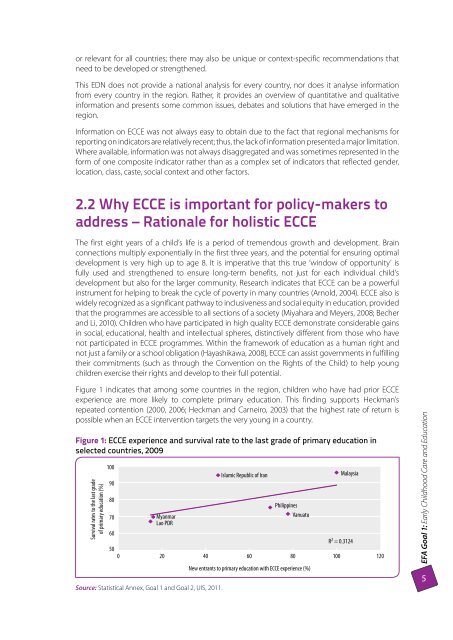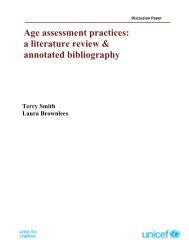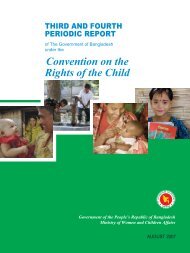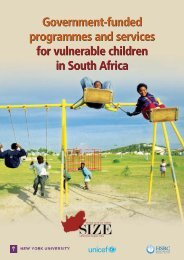EFA Goal 1: Early childhood care and education; Asia ... - Unicef
EFA Goal 1: Early childhood care and education; Asia ... - Unicef
EFA Goal 1: Early childhood care and education; Asia ... - Unicef
Create successful ePaper yourself
Turn your PDF publications into a flip-book with our unique Google optimized e-Paper software.
or relevant for all countries; there may also be unique or context-specific recommendations that<br />
need to be developed or strengthened.<br />
This EDN does not provide a national analysis for every country, nor does it analyse information<br />
from every country in the region. Rather, it provides an overview of quantitative <strong>and</strong> qualitative<br />
information <strong>and</strong> presents some common issues, debates <strong>and</strong> solutions that have emerged in the<br />
region.<br />
Information on ECCE was not always easy to obtain due to the fact that regional mechanisms for<br />
reporting on indicators are relatively recent; thus, the lack of information presented a major limitation.<br />
Where available, information was not always disaggregated <strong>and</strong> was sometimes represented in the<br />
form of one composite indicator rather than as a complex set of indicators that reflected gender,<br />
location, class, caste, social context <strong>and</strong> other factors.<br />
2.2 Why ECCE is important for policy-makers to<br />
address – Rationale for holistic ECCE<br />
The first eight years of a child’s life is a period of tremendous growth <strong>and</strong> development. Brain<br />
connections multiply exponentially in the first three years, <strong>and</strong> the potential for ensuring optimal<br />
development is very high up to age 8. It is imperative that this true ‘window of opportunity’ is<br />
fully used <strong>and</strong> strengthened to ensure long-term benefits, not just for each individual child’s<br />
development but also for the larger community. Research indicates that ECCE can be a powerful<br />
instrument for helping to break the cycle of poverty in many countries (Arnold, 2004). ECCE also is<br />
widely recognized as a significant pathway to inclusiveness <strong>and</strong> social equity in <strong>education</strong>, provided<br />
that the programmes are accessible to all sections of a society (Miyahara <strong>and</strong> Meyers, 2008; Becher<br />
<strong>and</strong> Li, 2010). Children who have participated in high quality ECCE demonstrate considerable gains<br />
in social, <strong>education</strong>al, health <strong>and</strong> intellectual spheres, distinctively different from those who have<br />
not participated in ECCE programmes. Within the framework of <strong>education</strong> as a human right <strong>and</strong><br />
not just a family or a school obligation (Hayashikawa, 2008), ECCE can assist governments in fulfilling<br />
their commitments (such as through the Convention on the Rights of the Child) to help young<br />
children exercise their rights <strong>and</strong> develop to their full potential.<br />
Figure 1 indicates that among some countries in the region, children who have had prior ECCE<br />
experience are more likely to complete primary <strong>education</strong>. This finding supports Heckman’s<br />
repeated contention (2000, 2006; Heckman <strong>and</strong> Carneiro, 2003) that the highest rate of return is<br />
possible when an ECCE intervention targets the very young in a country.<br />
Figure 1: ECCE experience <strong>and</strong> survival rate to the last grade of primary <strong>education</strong> in<br />
selected countries, 2009<br />
Survival rates to the last grade<br />
of primary <strong>education</strong> (%)<br />
100<br />
90<br />
80<br />
70<br />
Myanmar<br />
Lao PDR<br />
Islamic Republic of Iran<br />
60<br />
R 2 = 0.3124<br />
50<br />
0 20 40 60 80 100 120<br />
Source: Statistical Annex, <strong>Goal</strong> 1 <strong>and</strong> <strong>Goal</strong> 2, UIS, 2011.<br />
Philippines<br />
Vanuatu<br />
New entrants to primary <strong>education</strong> with ECCE experience (%)<br />
Malaysia<br />
<strong>EFA</strong> <strong>Goal</strong> 1: <strong>Early</strong> Childhood Care <strong>and</strong> Education<br />
5

















